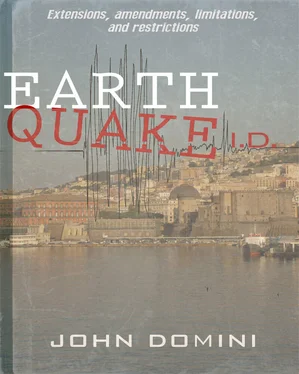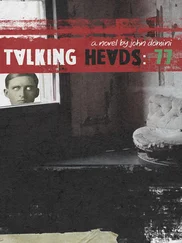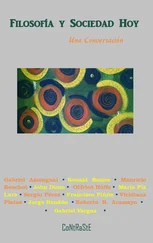“Do we still think,” Dora was asking, “Mama and Papa are going to divorce?”
Now what would Nettie say about a mother standing breathless outside her children’s door?
“I thought we said we don’t, any more,” Sylvia said. “No, I want the bird.”
“I know what we said. Come on, you know it’s not a bird.”
“Our family is very good. Like, when Paul does a miracle, that shows Jesus is with the family. It reveals the Word of Jesus.”
“Maybe.” After a moment, Dora sighed.
“Dor-ra. I know it’s not a bird. I know we said it’s a singing Siren.”
The other remained quiet so long, Barbara gathered herself to walk in. Then: “That was pretty weird, in the museum.”
“Yeah.” The mother pictured Sylvia frowning, trying out a new complexity. “But, since because Paul wasn’t hurt, that just shows like, Jesus is still there—”
“I wasn’t talking about Paul. What happened with Paul was an adventure, like in the movies. What I was talking about was Mom.”
“Oh, Mom. You mean when she took us in the room.”
“Now that was weird.”
“That was very weird. It was like hide and seek.”
“It was hide and seek and telling stories, but they didn’t go anywhere.”
There was a rap of plastic on linoleum. “Paul saved us. He got us out of there.”
“Right, he did but then since — that means, the people he’s saving, it’s us. We used to think Mama and Papa were getting a divorce.”
“Look. It was weird, but it wasn’t that weird.”
Barbara cleared her throat, shuffled her slippers, oldest tricks in the book. She walked in and at once began tucking both the linens and “the three girls” back into their more crowded arrangement. A little high-energy group activity, as they called it around the Connecticut Children’s Services. Anyway, even CCS couldn’t say for certain whether it was best if Mama talked with the girls about what she’d heard. The guidelines for good parenting were full of that word “boundaries.” Barbara wound up letting Dora and Syl work out their own solutions, in this case. Herself, she heard something else, in the conversation. She realized that if the twins had been talking about divorce, they would’ve been overheard. Even Kahlberg’s drivers had spoken enough English to understand that. Then there’d been the boys, a lot louder than the girls.
Talk in the streets. That night, in bed, Barbara shared her conclusions with the Jaybird, a born-again wife whispering with her recuperating husband. I ‘ m saying, they got it off the kid-wide-web .
Such was the soundtrack by which Barbara pledged allegiance to her renewed commitment: whispers in bed, the putt-putt of a keyboard, and rosaries beside the washer and dryer. She couldn’t speak of the thing more openly — not with the other woman in the house. Yet the very fact that she and Aurora never exchanged a significant word seemed to make the gaudy seventy-something all the more haunting. Aurora, for instance, turned out to have made it possible for John Junior to duck out of the apartment, Tuesday afternoon while the parents had been down on the Bayfront.
On the spur of the moment, that afternoon, the oldest and second-oldest had taken a jaunt over to Castel Sant’Elmo. Elmo — an Italian corruption of Erasmus, the patron saint of sailors, in honor of whom seafarers had come up with the expression “St. Elmo’s fire.” The stuff wasn’t really fire, rather a kind of static electricity, just as Erasmus wasn’t truly Elmo, or the saint of fire. But the counterfeit had stuck. If an American thought of St. Elmo, he thought of fire, because of Moby Dick or a dumb movie. Or perhaps the American was a bookish teenager fascinated by invisible forces like an electro-magnetic pulse. Chris would make the connection, yes. He’d know where to find the castle, too. Sant’Elmo was a brooding heap almost as old as dell’Ovo and the same dirt-yellow. It stood on the heights of the Lulucitas’ neighborhood, ten minutes’ walk from the apartment.
Nonetheless JJ would never have gotten to the castle, while the parents were out of the house, if his grandmother hadn’t gone to bat for him. Aurora had accompanied the boy down to the piazza, and she’d made sure to keep the policemen she’d spoken with out where the TV cameras could get a clean shot.
My good-looking young grandson here , she’d told the officer in charge, is withering away, positively withering away, from sitting around the house all day .
JJ used the same argument on Barb: Mom, I’m sick of this. When she pressed him, the boy upped the stakes. “You’re telling me I have to stay home all day, every day? Forget about it. Book me a flight to La Guardia.”
John Junior defended Aurora too, saying she’d made him laugh. Think of the benefit to your womenfolk , the grandmother had told the cops. The girls in this city have been pining away, absolutely pining away, for lack of their eye-candy .
On top of that, JJ pointed out, Aurora had known better than to bring Paul downstairs. She’d understood that Paul and the girls had to stay in the apartment, and she’d made sure that the two older boys had a plainclothesman bodyguard, too, while they enjoyed a bit of sulfur-dusted air and sun. As for Sant’Elmo, JJ claimed, it was handy. “I mean, Mom, do you think you could remember we’re the same as anybody else? We’re just normal young Americans.” If you asked him, the folks around the Vomero were doing a better job of that than his own mother. During his time outside, John Junior got the distinct impression that the local miracle-frenzy had started to fade. The believers in the streets had been content with a wave or a nod, and none of the media had bothered to follow the brothers out of the piazza. JJ could swear he’d heard a newsstand owner shout lascia li stare , leave them alone.
Really, the boys’ little “prison-break” was nothing that Mom should worry about. “We had a good time, over there. Sant’Elmo, it’s got all these neat places to hide.”
The mother’s voice tightened, though with the grandmother in the apartment she couldn’t shout. Had JJ forgotten how, just the day before…?
The boy rolled his eyes. “Nobody’s gunning for us , Mom. That was all about Our Man in NATO.”
Barbara’s husband had given her the same assurances, or reassurances, during their walk along the waterfront. Of course the couple had their protection inching along the boulevard behind them, a Consular sedan, bulletproof. Roebuck had arranged the car, the driver, and the armed guard. But Barbara and Jay got the time alone that the husband had announced they “could use,” following “a meeting like this, a roller coaster.” The two of them strolled close by the small boats tethered to the rocks, wooden craft many of them, hand-painted. With the rumble of the other traffic, with the breeze and the sea, husband and wife could speak from the heart. The Jaybird had pointed out that up at the Refugee Center, during the near-month since his near-kidnap, the American Boss had often spent as much as an hour out of sight of his flak-jacketed protectors. If Silky’s crooks had wanted a piece of him, they’d had plenty of opportunity.
Barbara had nodded but frowned. Even as she and her husband talked, she’d noticed a refugee African on their tail. When they’d gone out along the breakwater, she’d called Jay’s attention to the man, an obvious clandestino . The poor guy hung back behind the Consulate’s Audi, in a torn t-shirt bearing a broken pillar.
The Jaybird had rolled his eyes — the expression that John Junior would imitate a few hours later. He’d asked if his Owl Girl was frightened of beggars all of a sudden. Frightened of the homeless, in this city? The husband could understand she’d been shaken up; her change of heart made everything more vulnerable, more precious.
Читать дальше












